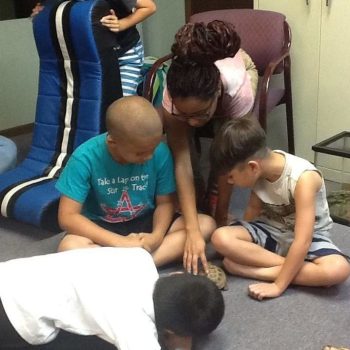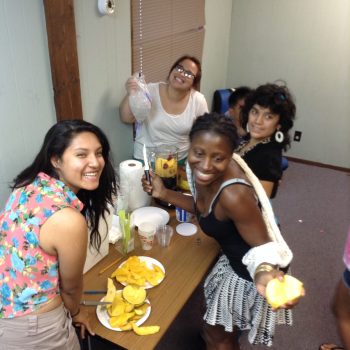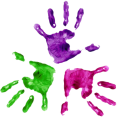Our All 3's Social Skills Groups
Aims to provide practice opportunities for clients in small groups. It allows participants to learn and generalize new social skills in real life situations.
In the programs, we provide real life social situations/scenarios and we also provide multiple opportunities for the children to practice and master each skills.
All 3’s is child centered, in that we use activities and tasks that the children enjoy and look forward to practicing.
We Focus On
Conversation
Friendship
Problem Solving



What Are Social Skills?
Social skills are a set of verbal and non-verbal communication skills that we use daily to get along with other people. We take these skills for granted, but for others, these skills are challenging. A child with social skills difficulties can have a hard time adjusting to changes in his or her environment and may act out verbally and physically with other people.
Social skills difficulties may lead to poor self-esteem, argumentativeness, oppositional behavior, and may even result in the child being rejected by other children.
All 3's Program Works By
Grouping clients according to similar needs, personalities, age range, and skill level.
Inviting 1 or 2 neurotypical peers to groups to increase more natural opportunities and generalization of social skills.
Hosting groups of 2 to 3 children that are guided by our speech pathologists.
Running continuous sessions with well-documented summary reports.
We recommend this service for children diagnosed with ADHD, Language Disorders, Language Delays, Autism, and any Developmental Disorder that impacts a child’s social relationship.
Skills Worked On By Age Group
Ages 2-4
Ages 3-6
Ages 4-6
Ages 6-10
Ages 10-17
Ages 2-4
Emotional Regulation – Recognize, label, and regulate feelings to demonstrate empathy towards others and read others emotions and body language.
Verbal Communication – Listening, sharing ideas, asking questions, answering questions, greetings, and more. e.g. Telling Simple Stories.
Group Play – Playing skills, turn-taking, solving problems, standing your ground, asking for help, and talking out conflicts.
Objective Outline
Talking Time
- Language and communication
- Joint attention (looking at other people to draw attention to something interesting and sharing the experience of it)
- Asking and answering questions
- Story Album (sharing stories of prior experience/knowledge)
Playing
- Pretend/imaginative play
- Showing off
- Following directions
- Learning to attend and listen
- Trying new things and accepting errors
- Engaging in purposeful play
Monkey See Monkey Do
- Expressing specific needs
- Learning to use words and phrases
- Learning signs and gestures
- Commenting and sharing
- Learning to join action
- Copying adults and other children
Ages 3-6
Skill Here – Recognize, label, and regulate feelings to demonstrate empathy towards others and read others emotions.
Verbal Communication – Listening, sharing ideas, asking questions, answering questions, greetings, and more. e.g. Telling Simple Stories.
Group Play – Playing skills, turn-taking, solving problems, standing your ground, asking for help, and talking out conflicts.
Objective Outline
Talking Time
- Language and communication
- Joint attention (looking at other people to draw attention to something interesting and sharing the experience of it)
- Asking and answering questions
- Story Album (sharing stories of prior experience/knowledge)
Playing
- Pretend/imaginative play
- Showing off
- Following directions
- Learning to attend and listen
- Trying new things and accepting errors
- Engaging in purposeful play
Monkey See Monkey Do
- Expressing specific needs
- Learning to use words and phrases
- Learning signs and gestures
- Commenting and sharing
- Learning to join action
- Copying adults and other children
Ages 4-6
Emotional Regulation – Recognize, label, and regulate feelings to demonstrate empathy towards others and read others emotions and body language.
Listening and Talking – Greets, initiates talking, makes comments, ask questions, listens and follows rules in games, share ideas, ask to talk, relates ideas during games, participate in cooperative play, resolve conflicts of the classroom.
Building Friendships – Participate cooperative play, resolve conflicts with peers, decide who to play with, share ideas, problem solves simple conflicts, learn to follow rules, share and turn taking, apply imagination.
Objective Outline
Body Language
- Reading 7 universal body languages
- Reading 7 universal facial expressions
- Expressing one’s feelings
- Understanding other’s feelings
Listening and Talking
- Asking and answering questions
- Starting a conversation
- Expanding conversation/commenting
- Joining a conversation/sharing ideas
- Following directions
- Ignoring
- Learning and active listening
Building Friendships
- Inviting someone to play
- Joining ongoing play
- Giving peers directions
- Accepting directions from peers
- Using imagination
- Being a good sport
- Accepting change in play
- Standing one’s ground
- Transitioning from play to learning
Ages 6-10
Self Regulation – Recognizing and understanding one’s own emotions as well as emotions that are expressed by others. Reading other’s cues and body language.
Conversation Skills – Greet others, share and listen to information, starting a conversation, maintaining a conversation, change topics, make comments, ask questions, announcing one’s actions, listening, and body language
Problem Solving Skills – Deciding if it is fair, sharing, playing with others, friendship rules, making choices, knowing what to do, talking it through, teasing, etc.
Objective Outline
Body Language
- Active Listening
- Reading the 9 subtle emotions
- Responding appropriately to 9 universal body languages
Listening and Talking
- Learning to initiate and expand ideas
- Asking and answering questions
- Making comments and changing topics
- Learning to end conversations
- Negotiating during conversations
Building Friendships
- Knowing how to make and keep friends
- Entering ongoing games/conversations
- Problem solving friendship problems
- Standing one’s ground
- Sharing ideas during games
- Understanding teasing
- Sharing and understanding feelings
Ages 10-17
The Jr. Tweets and Tweets social skills groups are for adolescents in middle school and high school respectively. Our goal is to help students learn ways to make and keep friends.
Objective Outline
Conversation Skills
- Participate in conversations
- Sharing one’s feelings about issues
- Starting conversations
- Changing conversations
- Expanding on conversations
- Choosing topics of conversation
- Ending conversations
Friendship Skills
- Understanding friendships
- Working with friends
- Knowing when to and not to share personal information
- Dealing with teasing
- Dealing with exclusion from peer groups
- Dealing with embarrassing moments
Body Language Skills
- Active and reflective listening
- Para-verbal language
- Subtleties in reading body language
- Learning to show effective body language
